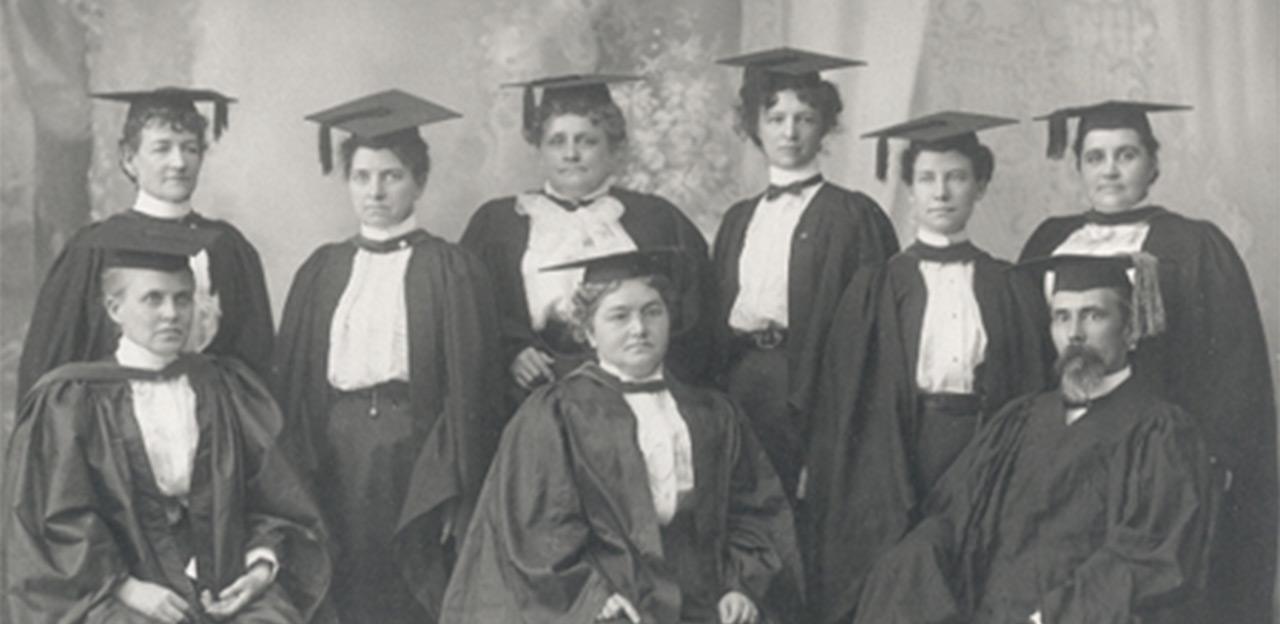
About Us

Washington College of Law’s Founding Mothers
Ellen Spencer Mussey and Emma Gillett founded the Washington College of Law in 1896 so that women, as well as men, could learn to practice law. Co-educational from the outset, the school thrived as its early graduates grew into some of the first female judges, high-level public servants, feminist agitators, and prominent litigators. Female faculty and deans steered the college through the First World War and the Great Depression, the passage of women’s suffrage, and the growth of Washington DC from a muddy provincial capital to a vibrant city that provided a world of opportunity for women lawyers.
After World War II and the merger with American University, the founding generation passed away. The faculty and students gradually lost touch with school’s feminist origins. Its outsized influence on women’s struggle for equality—and on the presence of women in the profession—shrunk.
The Women and the Law Program
In 1984, as the feminist movement resurged in the United States, the Washington College of Law recognized that the school’s founding legacy was too important to remain a mere interesting historical footnote. To honor the founding mothers and to foster in the next generation of women lawyers, the faculty founded the Women and the Law Program.
At that time, women’s rights and feminist theory were not yet part of mainstream legal education. It was up to Faculty Director Ann Shalleck to invent how to “integrate gender into legal education.” She collaborated with WCL faculty members and feminist legal scholars from around the nation to build networks that to this day support and nurture intersectional feminist inquiry into the complex interplay between social structures, such as race, class, ability, gender, and the law. She developed teaching and training materials where none existed, founded influential feminist journals so that scholarship on legal questions long ignored by the academy could bloom, and pioneered innovations in clinical legal education to reflect the lived reality of female clients and students, rather than elite lawmakers.
Integrating Gender into Legal Education Today
Thirty-five years after our founding, the Women and the Law Program’s fundamental mission remains more urgent than ever: “Integrate gender into all aspects of legal education, doctrine, and practice.”
The world has changed, but the promise of gender-based equality remains unfulfilled. Women and LGBTQ+ people face violence, discrimination, and inequality every day, all around the world. Impunity for gender-based violence remains rampant. The pay gap and the maternal penalty in employment are real. Lesbian, gay, and bisexual people lack basic legal protections from discrimination. Social protection systems built with single-male earner households in mind fail our families. Human trafficking and labor exploitation prey on those seeking to make better lives for themselves. Family law reflects outdated gender roles and assumptions about sexuality. Non-binary people struggle for legal recognition. Transgender people experience poverty and hateful violence. Racism, sexism, ableism, and poverty hamper human flourishing, in a mutually reinforcing web. While we’ve made great legal strides, there is still much work to do.
Our job is to train the lawyers who can do it.
It’s a big brief, but one that we, under the leadership of Faculty Director Ann Shalleck and Director Daniela Kraiem, accomplish by collaborating with colleagues from across the Washington College of Law, American University, and the globe.
Inspired by American University’s Strategic Plan, we organize our work into three categories: Teaching gender and law to students in the Washington College of Law’s JD, LLM, and SJD programs; Fostering scholarship at the core of American University’s Social Equity research imperative; and Building an inclusive community rooted in gender justice.
Join us by learning more about each below, or visit our Studying Gender and Law at WCL page for information about applying to one of the Washington College of Law’s world-class programs.

